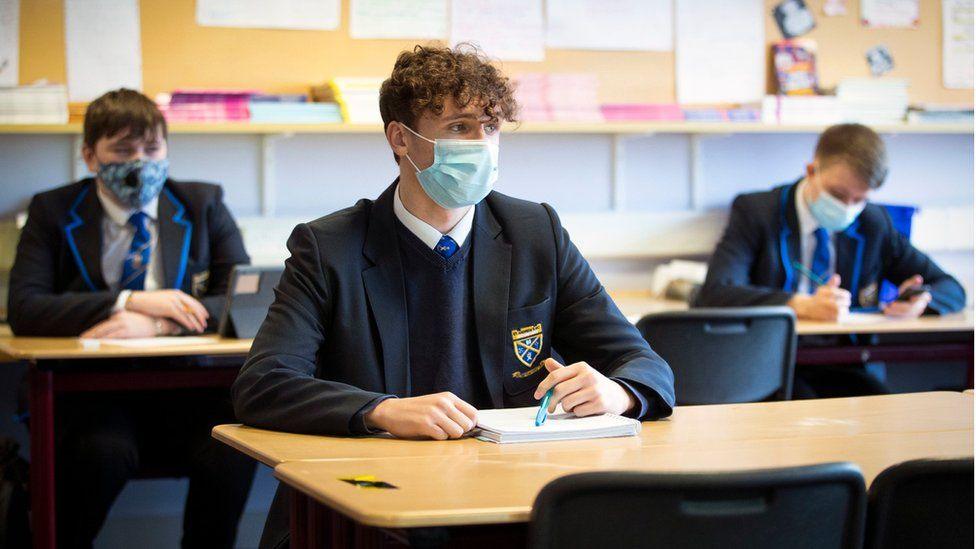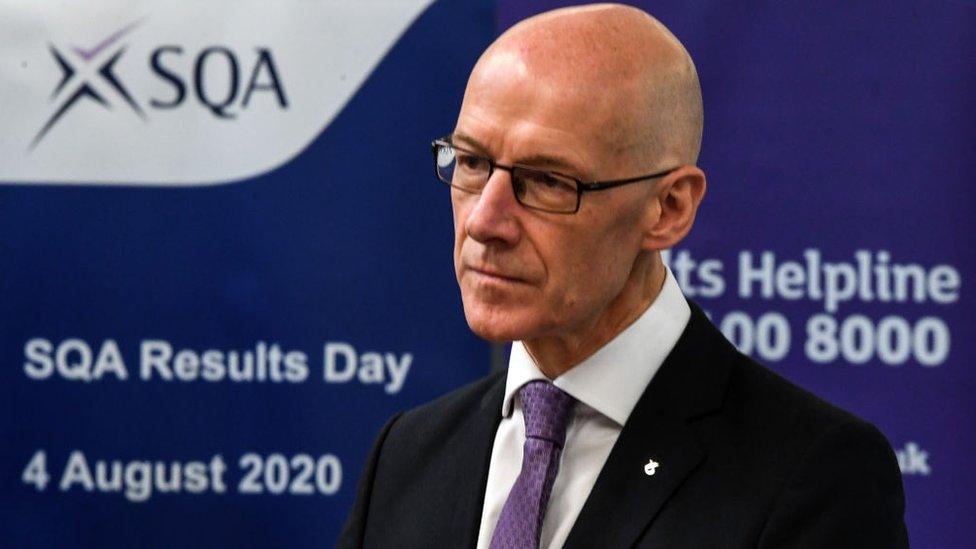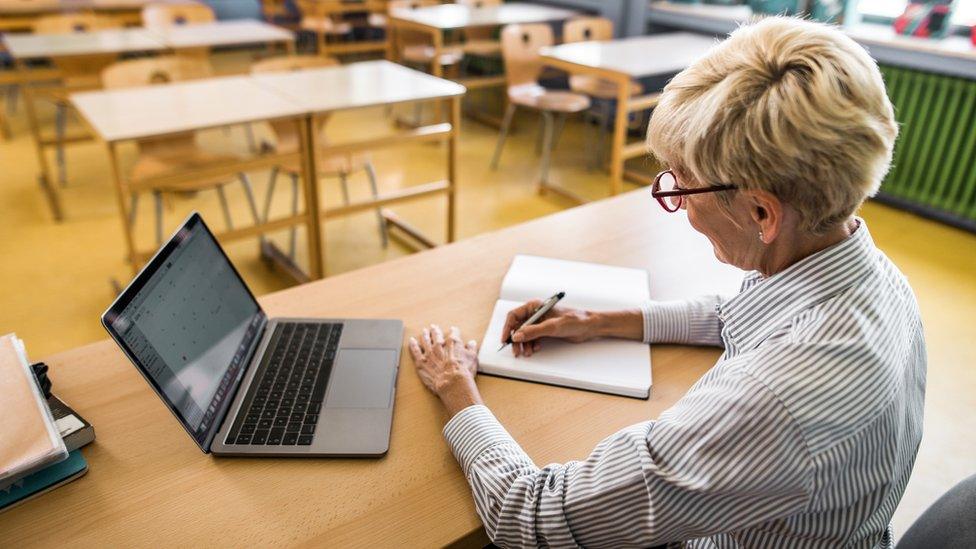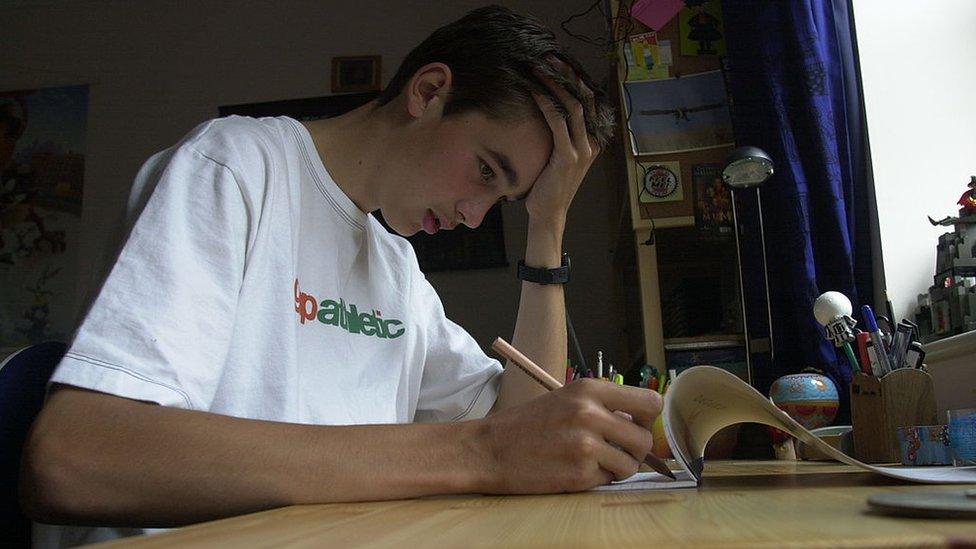Covid in Scotland: What's happening with this year's school 'exams'?
- Published

Senior school pupils are in the middle of sitting assessments which will decide their qualifications.
Formal exams were cancelled for the second year in a row because of disruption caused by the pandemic.
The replacement system is meant to be based on "teacher judgement" backed up by assessment. So how is it going?
The original plan

John Swinney announced the cancellation of exams last December
The system put in place to award grades for National 5s, Highers and Advanced Highers this year is called the Alternative Certification Model.
It was first created after Deputy First Minister John Swinney announced the cancellation of National 5 final exams, which are mostly sat in fourth year.
Then it was updated when Highers and Advanced Highers, which are sat in fifth and sixth year, were also cancelled in December last year.
Instead of final, end-of-year national tests, the model was meant to rely on teachers gathering evidence throughout the remainder of the school year and using that to support the grades they submit to the Scottish Qualifications Authority (SQA).
How has it changed?

Results are due to be sent to pupils on 10 August
The second national lockdown and a return to remote learning in January meant that the model had to be adapted to focus on just "teaching and learning" until after the Easter holidays.
This has resulted, for many, in a bulk of assessments coming at once, leading to claims these were "exams by another name".
Some schools are giving study leave, others are doing the assessments within the normal school day.
It's a scenario which earlier documents from the SQA show it was hoping to avoid.
The organisation's update from 16 December, external, before the latest lockdown was announced, said "schools and colleges will need to plan accordingly to give all learners appropriate time to prepare for each subject. This will help to avoid learners being overloaded with multiple assessments at any one time."
The SQA has since cut back on the number of pieces of evidence teachers need to provide, and pushed back the date that they have to submit grades until 25 June.
When will results be given?
The SQA is currently sampling work from schools to make sure the marking schemes are correct, and providing feedback to teachers.
Colleagues across local authorities are also involved in what's being called "quality assurance", to make sure marking is fair.
Teachers will tell pupils their provisional grades before the end of term.
The model calls them provisional, but there are reassurances that these grades will not be changed unless there has been some sort of computer or human error - and not because of an algorithm or external marking. Official certificates will arrive on 10 August.
What do those involved think?

Teaching unions are split over the best way to assess pupils during the pandemic
Some teaching unions have argued against the certification model. Seamus Searson, from the Scottish Secondary Teachers Association, told the BBC's Good Morning Scotland programme that the system would "not work in the best interests of pupils". He is worried that time constraints will mean teachers "can't get enough evidence to prove what the youngsters can really achieve".
Dr Patrick Roach, NASUWT general secretary, said a "failure to make timely decisions" had led to schools "having insufficient time to undertake what is a mammoth task of preparing assessments, marking and quality assurance".
However, the EIS teaching union helped create the model and says it gives pupils "the best opportunity to demonstrate what they have learned".
Some pupils have told the BBC about the stress they are under, and Scotland's largest independent parents' group has questioned the fairness of assessments.
The Scottish government and the SQA have repeatedly argued that the model is the best way to measure how well pupils are doing academically in the current circumstances.
An SQA spokesman said: "We fully appreciate that this is a challenging time for learners across Scotland.
"The National Qualifications 2021 Group, which includes the representation from across the education system, co-created this year's alternative certification model.
"SQA has provided a flexible and consistent framework for schools and colleges this year, including detailed guidance, material and support, based on assessment standards that teachers and lecturers are familiar with."
How will appeals work?

We still don't know.
The SQA started a consultation on how it could work. This included options which would have schools deal directly with appeals, and ones where they are passed on to the SQA.
The final plan, which was due in "early May", is now expected imminently. It's thought the new education secretary, Shirley-Anne Somerville, will have to give it the final go-ahead.
What will be worth watching closely is whether the system allows for grades to be revised down as well as up when they are re-marked during an appeal.
This could be seen as discouraging pupils not to put themselves forward, if their mark could go down.

